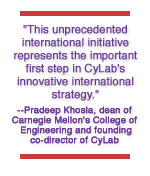
Hyong Kim, a Carnegie Mellon electrical and computer engineering professor, will direct CyLab Korea. |
Carnegie Mellon and Korean officials have agreed to create a new collaborative research lab for the study and development of leading-edge security technologies.
Officials from the Korea Information Security Agency (KISA) have pledged $6 million over the next three years to establish CyLab Korea at Carnegie Mellon. KISA will also establish CyLab Korea in Seoul, Korea, with more than 10 research staff members. Both sites will work together on research projects and develop new technologies and paradigms that will usher in an era of more secure computers, networks and communications systems.
The Korea Information Security Agency was established in 1996 to create a safe and reliable information distribution environment by reacting effectively to a variety of electronic infringement and intrusions. KISA is a center of excellence responsible for the computer network security of commercial information technology infrastructure that covers nearly 90 percent of the entire infrastructure of information technology in the Republic of Korea (South Korea).
 "This unprecedented international initiative represents the important first step in CyLab's innovative international strategy," said Pradeep Khosla, dean of Carnegie Mellon's College of Engineering and founding co-director of CyLab, a university-wide, multidisciplinary initiative to advance research and education in trustworthy computing.
"This unprecedented international initiative represents the important first step in CyLab's innovative international strategy," said Pradeep Khosla, dean of Carnegie Mellon's College of Engineering and founding co-director of CyLab, a university-wide, multidisciplinary initiative to advance research and education in trustworthy computing.
"That strategy recognizes the need for international partnerships to successfully protect our information infrastructure and the critical physical infrastructures that depend on it. As global economies become more digital and global supply chains more integrated, our economic interests can be jeopardized," Khosla said.
"The main thrust of this agreement is to continue to work with our Korean colleagues to develop a next generation intelligent system that will develop ways to monitor, detect and prevent the sabotage of data and networks by viruses, worms and malicious attacks," said Hyong Kim, an electrical and computer engineering professor at Carnegie Mellon and director of CyLab Korea.
The global business community estimates that network attacks and a flood of annoying spam accounts for 45 percent of worker downtime and costs companies more than $150 billion a year.
 "This important collaboration with Carnegie Mellon will provide a more secure digital environment for Korea and increase our capabilities in today's competitive information technology market," said Hong-Sub Lee, president of KISA, an agency of Korea's Ministry of Information and Communication (MIC).
"This important collaboration with Carnegie Mellon will provide a more secure digital environment for Korea and increase our capabilities in today's competitive information technology market," said Hong-Sub Lee, president of KISA, an agency of Korea's Ministry of Information and Communication (MIC).
Carnegie Mellon Provost Mark Kamlet said the new collaborative agreement underscores the university's growing leadership in the area of Internet security research.
"We have more than 200 faculty, students and staff from six departments working at Carnegie Mellon CyLab to develop and deploy self-healing computer networks and create cyber-awareness at all levels," Kamlet said.
About Carnegie Mellon CyLab
Carnegie Mellon CyLab is a university-wide, multidisciplinary initiative that builds on more than two decades of Carnegie Mellon's leadership in information technology and involves more than 200 faculty, students and staff from six departments and three colleges within Carnegie Mellon. CyLab's comprehensive research program spans technology, management and policy issues. CyLab offers professional master's degree programs in networking and security through the Information Networking Institute, the education arm of CyLab, and a cache of executive education programs. CyLab also participates in the Federal Cyber Service Scholarship for Service (SFS) program for graduate information security education and offers an education and research capacity building for faculty and members of minority serving institutions. Carnegie Mellon has been designated as a Center of Academic Excellence by the National Security Agency.
About Korea Information Security Agency
The Korea Information Security Agency (KISA) was established in 1996 to create a safe and reliable information distribution environment by reacting effectively to a variety of electronic infringement and intrusions. KISA has devoted itself to enhancing the security and reliability of electronic transactions by developing and supplying cryptographic algorithms, including SEED and KCDSA. In addition, KISA has led the development of information security in Korea through the information technology security system evaluation, information security education and public awareness campaign and information security, policy and legislative framework research. KISA is a center of excellence responsible for the computer and network security of commercial information technology infrastructure that covers nearly 90 percent of the entire information technology infrastructures in the Republic of Korea (South Korea).
Chriss Swaney

 "This unprecedented international initiative represents the important first step in CyLab's innovative international strategy," said Pradeep Khosla, dean of Carnegie Mellon's
"This unprecedented international initiative represents the important first step in CyLab's innovative international strategy," said Pradeep Khosla, dean of Carnegie Mellon's  "This important collaboration with Carnegie Mellon will provide a more secure digital environment for Korea and increase our capabilities in today's competitive information technology market," said Hong-Sub Lee, president of KISA, an agency of Korea's Ministry of Information and Communication (MIC).
"This important collaboration with Carnegie Mellon will provide a more secure digital environment for Korea and increase our capabilities in today's competitive information technology market," said Hong-Sub Lee, president of KISA, an agency of Korea's Ministry of Information and Communication (MIC).